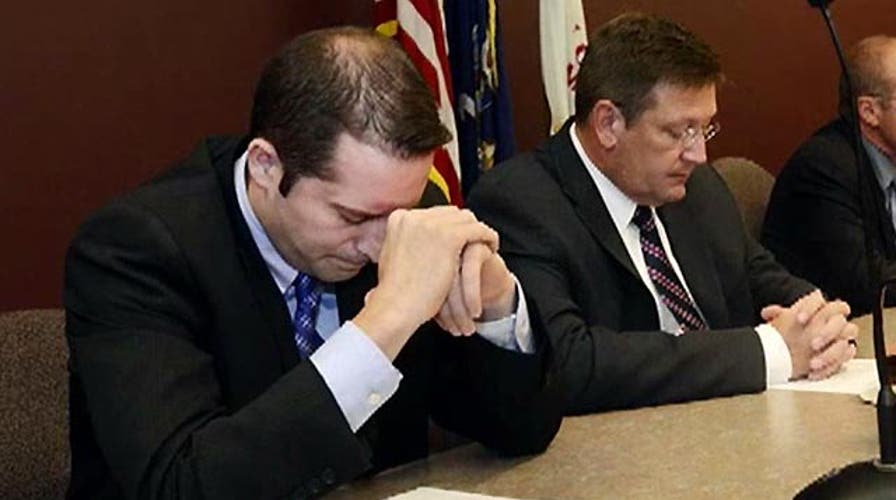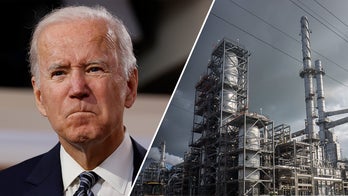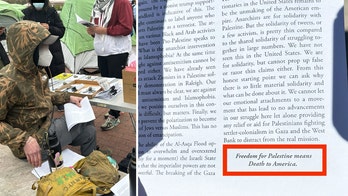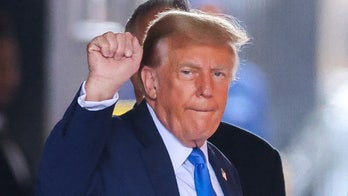Public prayer at center of landmark Supreme Court case
Town's council meeting tradition challenged in New York State
Nestled along the southern shore of Lake Ontario, the town of Greece, N.Y., with its population of 96,095 people and median household income of $53,541, would appear to be everything the town boasts of being in its promotional literature: namely, "a great place to live, work, and play."
It is also a great test case -- in what is shaping up as the most important church-state litigation to reach the U.S. Supreme Court in three decades, with the Obama administration taking what is perhaps a surprising stance on the matter.
As far back as 1997, local officials in Greece opened the town's monthly council meetings with a prayer, usually delivered by a Christian clergyman who responded to the town's invitation to do so. "Grant these servants of yours the help they need to guide our community wisely," intoned a priest from the Holy Name of Jesus parish to kick off the meeting of July 21, 2009.
But not all of the opening prayers were so ecumenical. "We celebrate your son, Jesus," said a pastor from Lakeshore Community Church that December. "We ask all this through Christ, our Lord," said another pastor, closing his prayer with the ritual "Amen."
In February 2008, two residents -- one Jewish, the other an atheist -- sued the town, claiming that the nearly exclusive reservation of the opening prayer for Christian clergy violated the First Amendment's prohibition on laws respecting an establishment of religion.
"During the nine-year period from the inception of the Town's prayer practice to the eve of the filing of this lawsuit -- a period involving exclusively Christian prayer-givers -- over two-thirds of the prayers included Christian language, and no other religious traditions were referenced," argued Susan Galloway and Linda Stephens in briefs filed with the Supreme Court in April. "The Town's litigating position -- that it would accept volunteers of any faith, whether clergy or otherwise -- was undercut by the Town's failure ever to announce, much less formally enact, an all-comers policy."
The district court rejected the plaintiffs' claims, but an appellate court overturned the lower court's ruling -- thus paving the way for the Supreme Court to hear the case.
Enter the Obama administration. Earlier this month, lawyers for the Justice Department, representing the federal government, filed an amicus curiae brief that -- to the surprise of some veteran Court watchers -- sided with Greece in arguing that the prayers pose no violation of the Constitution.
"Neither federal courts nor legislative bodies are well suited to police the content of such prayers, and this Court has consistently disapproved of government interference in dictating the substance of prayers," argued Solicitor General Donald B. Verrilli, Jr.
The government brief went on to make a subtler argument, one sure to attract further scrutiny from the administration's critics. "The court of appeals' [sic] approach," wrote Verrilli, "would inevitably require courts to decide questions such as whether references to the 'Holy Spirit' are uniquely Christian, whether prayers addressed to 'Allah' are uniquely Muslim, and whether references in particular prayers to 'King of Kings' are Jewish, Christian, or Muslim."
"In some sense, this is a surprising decision by the Obama administration. The administration had taken a very separationist view when it comes to church-state issues, and HHS contraception," said Jeffrey Rosen, the longtime Supreme Court correspondent for the New York Times Magazine and The New Republic who is now president and CEO of the National Constitution Center in Philadelphia. "This is a hugely controversial issue on the Court, and some of them -- the more liberal justices -- may be inclined to push back against the Obama administration's position."
The administration is presently maintaining in multiple court cases that the proprietors of faith-based institutions, such as religious hospitals and charities, must collaborate with insurers to provide contraception for female employees as part of their health care plans, even if doing so violates the employers' religious beliefs. The litigation arose as part of the myriad legal challenges to mandates issued by Health and Human Services Department under the president's health care overhaul.
"In one case, you've got the government (effectively) saying a prayer in front of a legislative assembly is constitutional and fine, which I agree with," said Jay Sekulow, chief counsel at the conservative-leaning American Center for Law and Justice."The same Department of Justice is arguing you can compel a business owner to violate their religious conscience when it comes to the issue of abortion. ... Those are not very consistent positions."
The last time the Supreme Court entertained a church-state separation case involving "legislative prayers" was in Marsh v. Chambers (1983), when the Court upheld the constitutionality of the practice. In that case, the Court held that overtly religious prayers can be used to open legislative sessions as long as the prayers were not used to proselytize, condemn other faiths to damnation, or otherwise incite non-believers.
The case of Town of Greece, N.Y. v. Susan Galloway, et al. [No. 12-696] is expected to come before the justices for oral argument in October or November.





